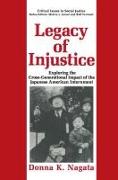- Start
- Legacy of Injustice
Legacy of Injustice
Angebote / Angebote:
At the age of 6, I discovered a jar of brightly colored shells under my grandmother's kitchen sink. When I inquired where they had come from, she did not answer. Instead, she told me in broken English, "Ask your mother. " My mother's response to the same question was, "Oh, I made them in camp. " "Was it fun?" I asked enthusiastically. "Not really, " she replied. Her answer puzzled me. The shells were beautiful, and camp, as far as I knew, was a fun place where children roasted marshmallows and sang songs around the fire. Yet my mother's reaction did not seem happy. I was perplexed by this brief exchange, but I also sensed I should not ask more questions. As time went by, "camp" remained a vague, cryptic reference to some time in the past, the past of my parents, their friends, my grand parents, and my relatives. We never directly discussed it. It was not until high school that I began to understand the significance of the word, that camp referred to a World War II American concentration camp, not a summer camp. Much later I learned that the silence surrounding discus sions about this traumatic period of my parents' lives was a phenomenon characteristic not only of my family but also of most other Japanese American families after the war.
Folgt in ca. 5 Arbeitstagen
